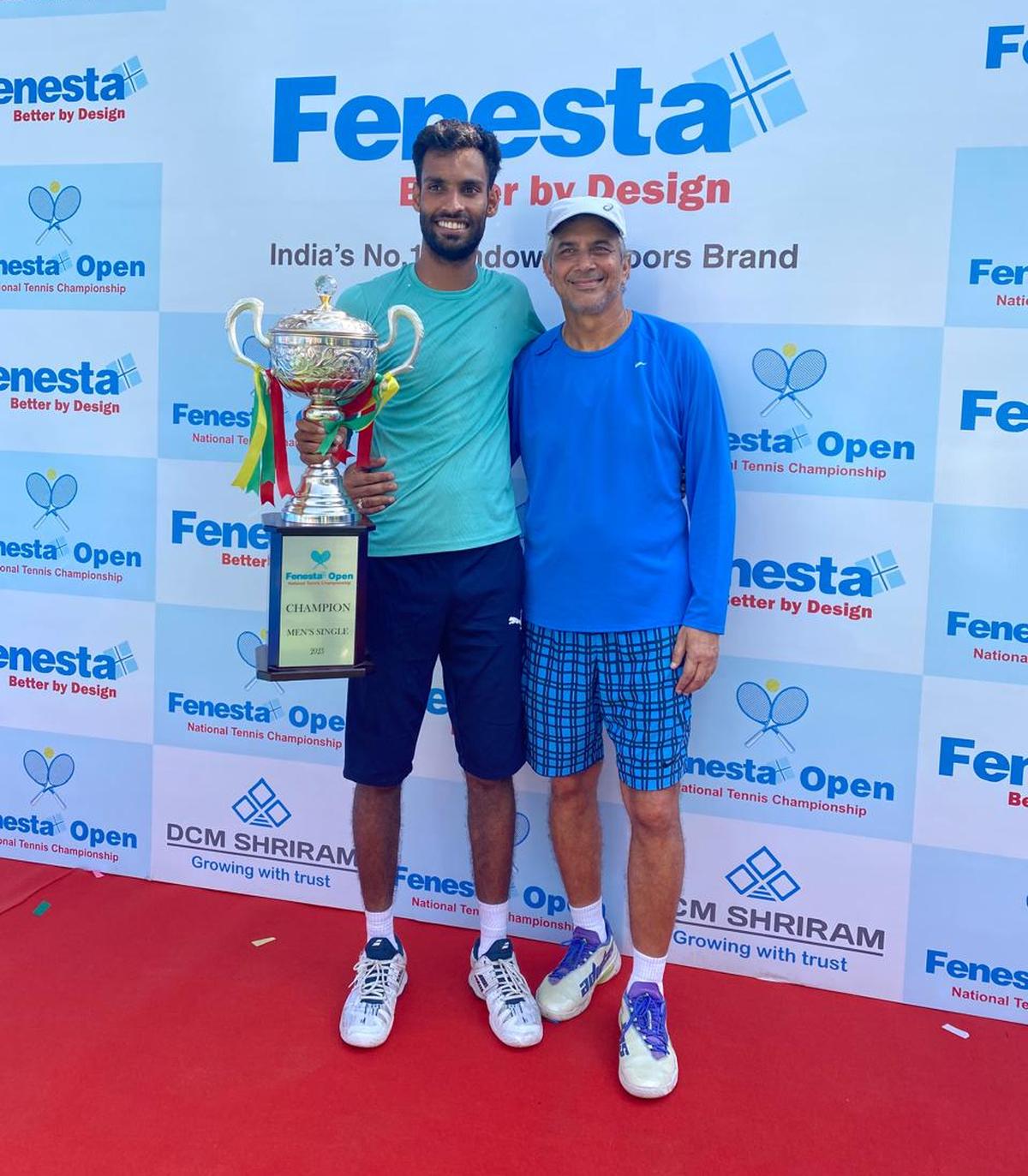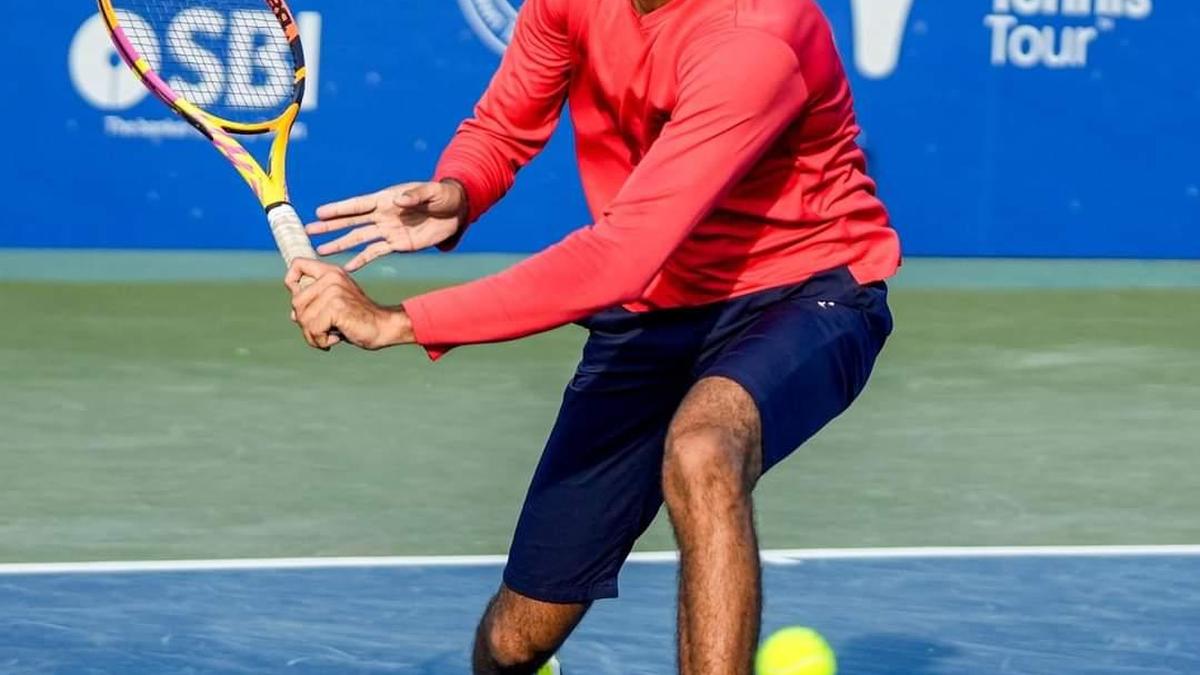Varanasi’s Siddharth Vishwakarma sets sight on Grand Slams after maiden Davis Cup call-up
When a seven-year-old Siddharth Vishwakarma picked up a tennis racquet and played in Varanasi’s Prabhu Narayan Union Club, little did he know he would get a call-up for India’s Davis Cup team against Sweden.
Alongside Vishwakarma, who will be marking his debut in the tournament, Sumit Nagal, Ramkumar Ramanathan, N Sriram Balaji, and Niki Poonacha have also been named in the squad. Teen Aryan Shah has been named in the reserves, with Ashutosh Singh succeeding Zeeshan Ali as the coach.
India defeated Pakistan 4-0 in February to seal its place in the World Group I stage, where it will face the Swedish side in Stockholm on September 14 and 15. With Ramanathan and Balaji being the usual picks for doubles and Poonacha also in contention, it looks like Vishwakarma could be handed his debut in this tie.
Vishwakarma, 29, felt ecstatic on receiving the news of his selection, which was broken to him by his coach, Ratan Sharma, about two days back. “I was practising when I got to know. I was happy to get what I was working hard for,” Vishwakarma told Sportstar.
READ | Ashutosh Singh replaces Zeeshan Ali as India’s Davis Cup coach
For his tryst with the sport, he credits two people: Rajesh Mishra – his uncle who suggested the sport to his nephew who used to often fall ill as a child, and Ratan Sharma – his coach who he dubs his “godfather”.
Ratan, who has been a coach since 1992, currently heads the Noida-based Winners Tennis Academy, which also happens to be Vishwakarma’s current training base. “It’s amazing, the amount of spin he can generate and the way he hits the ball with both power and speed. Ussi time decide ho gaya tha (It was decided that time itself). I knew that the player was there,” said Ratan, who first observed a teenage Vishwakarma in Lucknow.
Although the left-handed player has been active for over two decades, his journey has included significant breaks. In 2018, he stepped away from playing and took to coaching to make ends meet. “My morale was completely down. I sought sponsorship from various people who promised support, but never did. It was Ratan sir who advised me to leave coaching and return to playing, to focus on my game. Since then, he has covered all my tournament and training expenses,” Vishwakarma explained.
Defending national champion Vishwakarma, who clinched his maiden title at the Fenesta championship in 2018, acknowledged the presence of good players in his hometown, but highlighted the challenges they face. “I’ve seen players who can do well at the international level, but there’s no exposure. We come from humble families, and tennis is an expensive sport. Varanasi is a small city known for its temples. As it’s mostly a religious place, there’s not a lot of exposure for sports.”
“My father would take me on a cycle and travel 15 kilometres for practice. Aisi condition thi (Such was our condition),” he added.
His first set of international tournaments were the ITF Thailand F1, F2, and F3 events in June 2017, which was made possible through the support of Mishra and Vikram Singh Sisodia, then-president of the Chhattisgarh State Tennis Association.

Siddharth Vishwakarma and his coach Ratan Sharma, who he dubs his “godfather”.
| Photo Credit:
Special Arrangement
Siddharth Vishwakarma and his coach Ratan Sharma, who he dubs his “godfather”.
| Photo Credit:
Special Arrangement
In 2022, Vishwakarma’s break from playing ended when Ratan persuaded him to return to the game. “I sat down with him, and I told ‘Whatever is in my hands, I will do it. You just play tournaments. You still have time. There are still 3-5 years with you,’” Ratan recalled.
In May 2024, Vishwakarma reached the final of the ITF M25 Addis Ababa tournament in Ethiopia but lost out to South Africa’s Philip Henning. The standout match in this competition was when Vishwakarma removed Benjamin Lock, world ranked 353 at that time, in the semifinal. “In Ethiopia, I faced breathing issues due to the high altitude but was somehow winning. I tried but couldn’t control my stance in the final. I should have won that,” the Indian, who is currently ranked 590 in the world, said.
After the tournament in Ethiopia, he competed in a couple of M15 events in Kazakhstan. However, he struggled to adjust to the cooler temperatures after coming from the intense heat of over 50 degrees back home. Additionally, the limited vegetarian food options forced him to rely mostly on pizza.
Next month, the Indian Davis Cup team will travel to Sweden to compete against the host in the World Group I stage at the Kungliga Tennishallen, an indoor stadium. This, according to Vishwakarma, will make things easier for him. If one looks at the altitude, Stockholm stands at just 28 metres, compared to Addis Ababa’s 2355 metres.
Travelling with Vishwakarma will be Sumit Nagal, who has faced him in several tournaments within the Indian circuit. The current India No. 1 has experienced a meteoric rise on the ATP circuit, with consecutive tournaments and back-to-back wins against higher-seeded opponents helping him reach the WR70 ranking. While Nagal had the resources to compete in numerous tournaments, Vishwakarma did not.
READ | Davis Cup: Mukund Sasikumar denies AITA ban, calls it ‘false information’
“Other players play for 35-38 weeks in a year, whereas I get barely 15 weeks. If I get so many matches, then I could also get closer to the top 200, even 150, and then become ineligible for Grand Slams,” he said.
When he played against Nagal, he noticed the entourage the now Olympian would have, whereas Vishwakarma, would have to shake the fatigue from travelling in the train’s sleeper berth before stepping onto the court. “He (Nagal) had the sponsors from the start. Since his childhood, he had the backing of Mahesh Bhupathi, and most of his training has been abroad.”
Indeed, Nagal had joined Indian tennis great Mahesh Bhupathi’s ‘Mission 2018’ – an Apollo Tyres initiative to search for India’s first singles Grand Slam champion. While this mission failed to bear fruit, Nagal had formed a good base when he trained at Bhupathi’s academy for a couple of years when he was a child.
“The main thing is to play more matches, which we don’t get. Ek raasta solid mil jaye (If only I get a solid pathway),” Vishwakarma hoped.
According to Ratan, taking it one year at a time is the way to go for the Varanasi boy. “The moment you bring your ranking up, these things become easy. Now our aim is to be there in the Grand Slam first, and on the way, we got the Davis Cup and maybe the Asian Games.”



